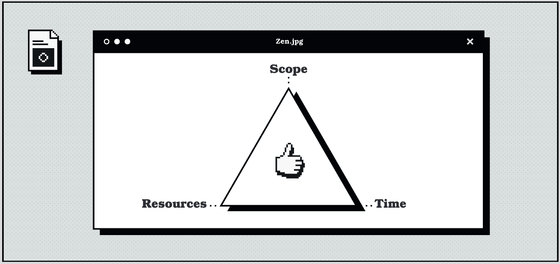How to overcome 'Parkinson's Law' - the unnecessary increase in work

James Stanier, Director of Engineering at Canadian e-commerce platform Shopify, discussed how
Parkinson's Law: It's Real, So Use It - by James Stanier
https://theengineeringmanager.substack.com/p/parkinsons-law-its-real-so-use-it
Political scientist Cyril Northcote Parkinson derived the law that 'the amount of work expands to fill the time available for its completion' from observing the ever-growing number of officials in the British bureaucracy.

According to Stanier, this law also applies to modern development sites, and projects with loose deadlines often take longer than necessary, leading to
This has to do with a key constraint on the project that Stanier calls the “iron triangle.”
Below is a diagram of the 'iron triangle,' which consists of three elements: 'scope,' or the amount of work that needs to be completed; 'resources,' or the people and tools available to carry out that work; and 'time,' or the time needed to complete it.

These three factors interact with each other in the same way: if you want to do more work, you need more people or more time, so changing one of them necessarily changes the other. This means that while you can choose to make something better, faster, or cheaper, you can't have all three at the same time.
Going back to Parkinson's Law, when time limits are unclear, your team will stretch the scope of their project work to fill the time available.
This is why setting deadlines is important, but it's also common to hear that 'false deadlines lead to bad work.'
Stanier acknowledged that this is true in some cases, but said, 'It's not so much a matter of methodology, it's more a matter of doing it wrong. In a healthy environment, setting aggressive deadlines for projects encourages innovation and creativity, but in a toxic environment, setting impossible deadlines will, as you can imagine, have negative consequences.'

Stanier is a published author in addition to his day job, and says he's able to find time to write between jobs because he and his publisher have imposed a 'challenging, but not impossible, schedule' on himself.
Stanier's books are also available in Japanese.

Setting deadlines is an important way to demonstrate leadership. For example, if you predict that it will take a month to create a prototype, you can start by encouraging your team to complete as much as they can by the end of the week.
The same goes for delegating work to others, and Stanier advises, 'When you ask someone to do something, be the first to suggest a deadline for when it should be done. Be clear, but leave room for negotiation. It's a very simple technique, but try it in a large company for a year and you'll be amazed at the difference it makes.'
Stanier concluded by saying, 'Deadlines are a powerful tool when applied with leeway, goodwill, and the knowledge to make people feel good. Parkinson's Law is a reality, and the larger the organization, the greater the challenge this law poses. If you can win this battle, you can finish projects quickly while growing yourself, even in an organization of tens of thousands of people, but if not, you'll eventually find yourself wondering, 'Why has my company become like a country hall?''
Related Posts:
in Note, Posted by log1l_ks







